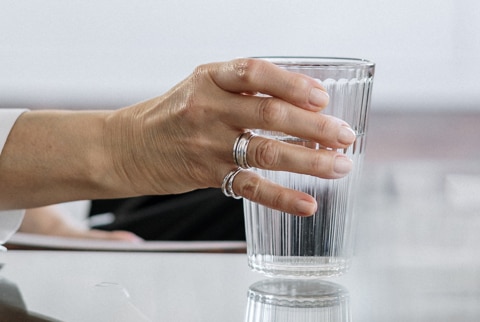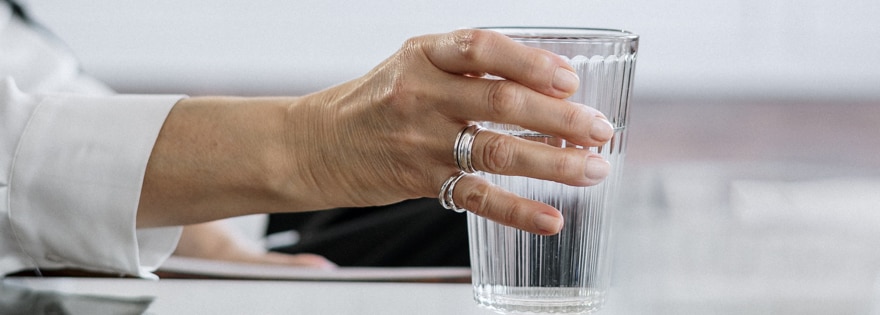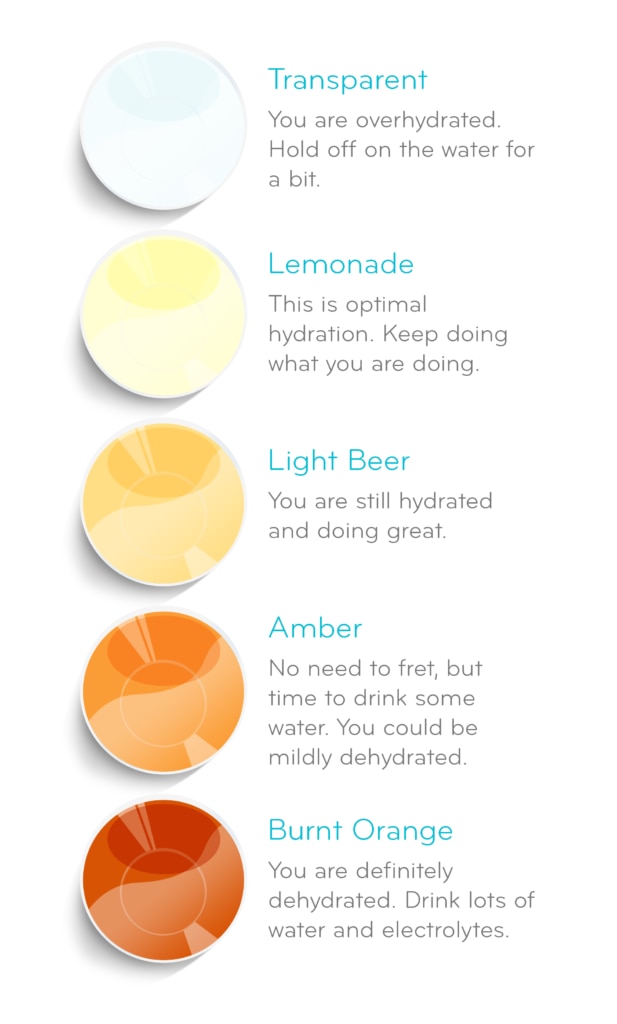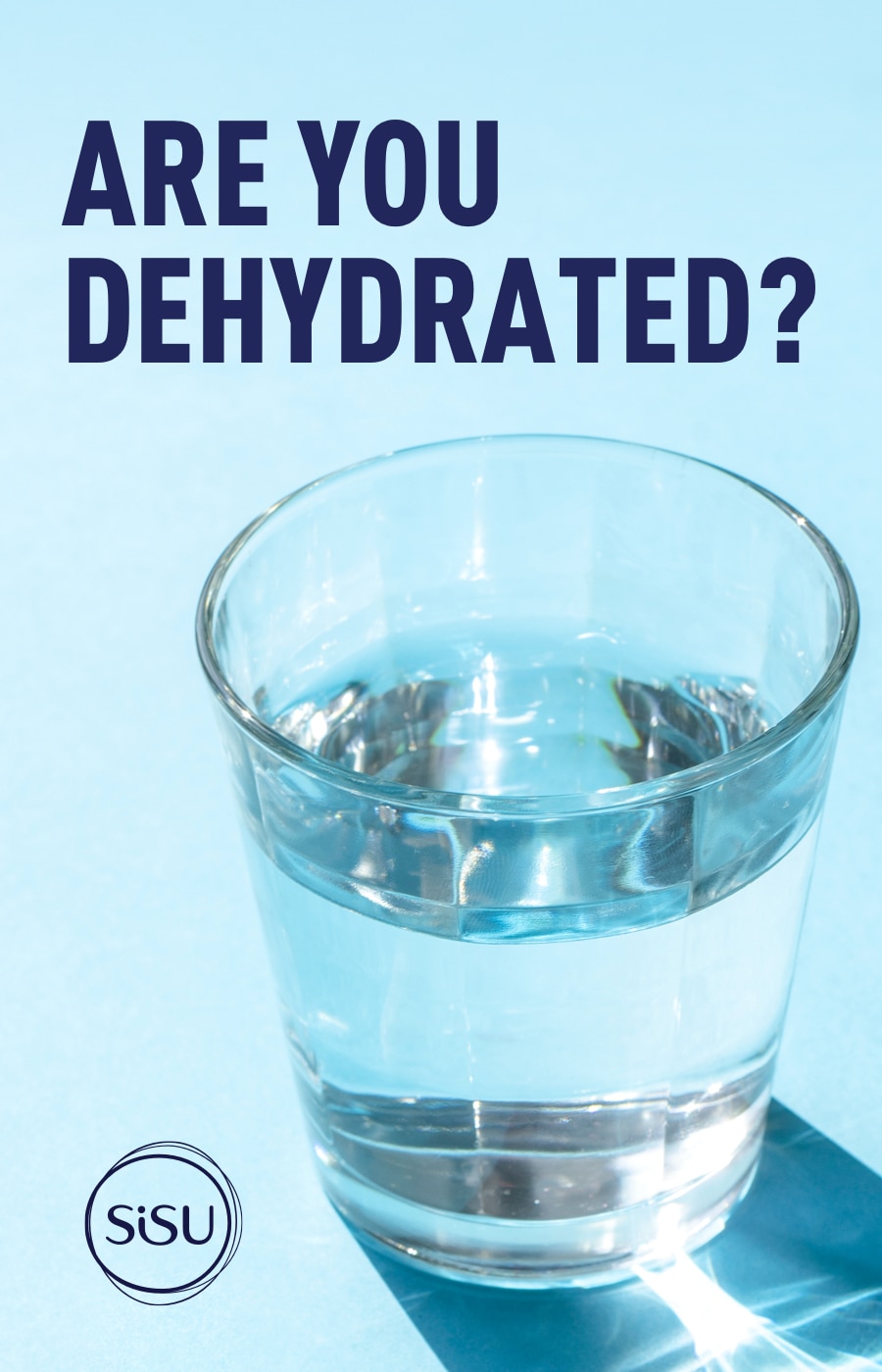
Feeling thirsty is only one sign of dehydration – your body has many ways of telling you to drink more water.

Water is an essential part of human life. It accounts for about 60% of your body weight and is crucial for most bodily functions. Drinking water helps support the immune system, regulate body temperature, keep joints lubricated, deliver nutrients to the cells, and keep organs functioning properly.
However, research shows that being even 1% dehydrated can negatively affect your mood, attention, memory, and physical performance. It’s important to be able to spot the signs of dehydration.1
Let’s look at a few:
How to tell if you’re dehydrated
1. Thirst
Thirst is the main way the body alerts you of dehydration. However, relying on the feeling of thirst alone is not an effective way to manage hydration. Your thirst mechanism lags behind your actual level of hydration – so by the time you feel thirsty, you are already dehydrated.2
You also may not even feel thirsty – but your body still needs water. The sensation of thirst diminishes with age, making it an unreliable indicator of dehydration for many adults.3
2. Skin
If you’re losing more water than you’re taking in, your skin will begin to show the symptoms of dehydration. Itchiness, dullness, dark under-eye circles, and increased appearance of fine lines or wrinkles are all signs of dehydration.
To find out if your skin is dehydrated, you can do a simple “pinch test” at home.
Pinch a small portion of skin on your cheek. If your skin doesn’t bounce back after you let go, it may be dehydrated.4
Note: Dehydrated skin and dry skin are often spoken about synonymously, however, they are very different. Dry skin lacks oils, while dehydrated skin lacks water. Dry skin is also a skin type, while dehydrated skin is a condition.
3. Bad breath
Don’t let your dehydration scare your friends away. One of the more unusual symptoms of dehydration is bad breath. This occurs because saliva contains antibacterial properties, and dehydration can prevent your body from making sufficient amounts of saliva.5
As a result, bacterial overgrowth can occur in the mouth – which may result in bad breath.
4. Urine
Paying attention to the colour of your urine is an easy way to keep track of how hydrated you are.
If your urine is completely transparent, it means you’re drinking more water than your body needs and you are overhydrated. On the other hand, if your urine looks darker than a light yellow colour you are probably dehydrated, and should try to drink more water.6

5. Headache
“Drink more water!” is a frequently suggested remedy for headaches – and for good reason. The brain is 80% water, and dehydration and a loss of water in the brain tissues cause the brain to shrink and pull away from the skull. This shrinking sends off pain receptors – resulting in a headache.7
Dehydration also causes your blood volume to drop, lowering the flow of blood and oxygen to the brain. In response, the blood vessels in the brain dilate, worsening the pain.8
A dehydration headache can range anywhere from feeling like a dull headache to an intense migraine. The pain can be felt anywhere on the head – front, sides, or back – but usually is not associated with pain on the face, like sinus headaches sometimes are.9
If you experience chronic headache pain, speak with your doctor about whether it may be caused by dehydration.
6. Fatigue
Your yawning doesn’t mean you need another cup of coffee – it might mean you need more water.
When dehydrated, your blood pressure can drop, decreasing blood flow to the brain and making you sleepy and fatigued. In order to maintain optimal brain function, try opting for a glass of water or two, instead of a caffeinated drink.10
7. Pain & Muscle Cramps
Recent medical research has shown that dehydration may make the brain more sensitive to pain. In the study, men who were dehydrated showed more pain activity in the brain than those who were hydrated.11
Dehydration can also cause muscle cramps. Fluids help muscles contract and relax, and keep muscle cells hydrated and less irritable. If you participate in warm-weather sports, you will lose water more rapidly and are at a higher risk of experiencing muscle cramps.12
8. Sugar cravings
Craving sugar is a common result of dehydration. A lack of fluid can make it difficult for the organs like the liver to release glycogen (stored glucose) and other components of your energy stores – which can lead to sugar cravings.13
 Food and drinks that dehydrate you
Food and drinks that dehydrate you
1. Coffee
Coffee – and other caffeinated beverages – have diuretic properties. Essentially, this means that they cause you to urinate more frequently, which may affect your hydration. In order to stay hydrated, as a rule of thumb, drink an extra cup of water for every cup of coffee.14
2. Alcohol
Alcohol causes dehydration in the same way as coffee – it is a diuretic, causing your body to remove fluids at a much faster rate than normal. In order to avoid that infamous “hangover headache,” make sure you’re not drinking on an empty stomach and continue to drink plenty of water throughout the night.15
3. Salty snacks
You probably already know that salty snacks make you thirsty – this is your body’s way of telling you to correct the sodium-water ratio. Not drinking enough water can force the body to draw water out of the cells, making you dehydrated.16
4. High-protein meals
High-protein meals are a common staple in athletes or bodybuilders. However, studies have shown that high-protein diets can increase dehydration. Essentially, metabolizing protein produces nitrogen waste, and the body requires more fluids to flush it out.
You don’t have to avoid a high-protein diet, simply drink more water to accommodate.
Tips to make hydration a habit
So now you know why drinking water is important, and how to spot the signs of dehydration. But drinking enough water every day can still be a challenge.
Here are some simple tips to help you stay hydrated:
- Download an app or get a water bottle that tracks your water intake: Daily Water Tracker, Hydro Coach, or Aqualert are all great apps that can help you stay hydrated, or purchase a “smart” water bottle that connects to your phone, and tells you when you need more water!
- Drink a cup of water at certain times each day: Get in the habit of drinking a cup of water after each time you go to the bathroom, as well as right after you wake up each morning and right before you go to sleep.
- Add a supplement powder: Add some fun flavour to your water by adding a supplement powder, such as Ester-CⓇ Energy BoostTM. This delicious drink mix supports the immune system while giving your water a burst of flavour. Available in orange, lemon-lime, wildberry, or piña colada, or try them all with our variety pack!
The low-down on H2O
Staying hydrated is always important – especially during the hot summer months. Thirst is only one symptom of dehydration, so it is important to pay attention to all signs your body gives you, and prioritize hydration in your diet and lifestyle.
For more bite-sized tips on how to live your healthiest life, follow us on Instagram! @sisuvitamins
Always read and follow the product label. Products may not be suitable for everyone.
1 https://www.sciencealert.com/here-s-what-happens-to-your-body-when-you-re-dehydrated
2 https://www.sciencealert.com/here-s-what-happens-to-your-body-when-you-re-dehydrated
3 https://health.clevelandclinic.org
4 https://www.healthline.com/health/dehydrated-skin#test
5 https://www.healthlinkbc.ca/
6 https://www.healthline.com/health/hydration-chart#dark-brown
7 https://au.thorzt.com/
8 https://au.thorzt.com/
9 https://www.medicalnewstoday.com/articles/317511#Symptoms
10 https://www.avogel.co.uk/health/sleep/are-you-really-tired-or-is-dehydration-making-you-sleepy/
11 https://journals.lww.com/anesthesia-analgesia/fulltext/2014/06000/Dehydration_Enhances_Pain_Evoked_Activation_in_the.23.aspx
12 https://www.mayoclinic.org/diseases-conditions/muscle-cramp/symptoms-causes/syc-20350820
13 https://www.timesnownews.com/
14 https://www.healthline.com/nutrition/does-coffee-dehydrate-you#caffeine-and-hydration
15 https://www.healthline.com/health/does-alcohol-dehydrate-you#causes
16 https://www.popsci.com/heres-what-happens-to-your-body-if-you-eat-too-much-salt/

